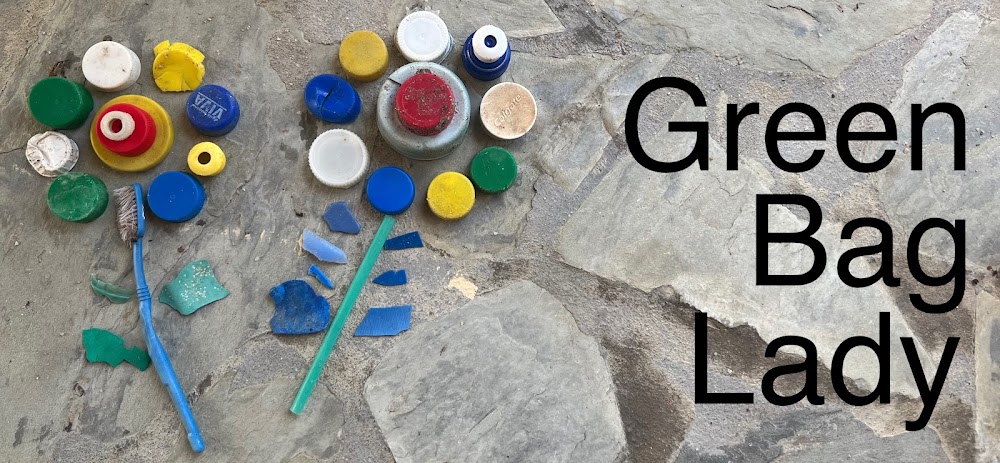A 5-cent fee on bags has gone smoothly in Washington, D.C. Below, a customer buys a bag to carrypurchases at the Chocolate Moose gift store.
Capital Takes Bag Tax In Stride from the Wall Street Journal
- SEPTEMBER 20, 2010
By SARA MURRAY And SUDEEP REDDY
WASHINGTON Nine months after Washington's city government imposed a five-cent tax on disposable shopping bags at food stores, the small fee has spurred a big change in behavior with little evident griping.
Recyclable bags have become a ubiquitous accessory, and stores are reporting a sharp drop in the use of plastic and paper bags.
"I am somewhat surprised by the extent to which people changed their behavior," said Christophe A.G. Tulou, acting director of the city Department of the Environment. "What we've done is created a market mechanism that gives people an incentive" not to use disposable bags.
When it took effect Jan. 1, the bag tax met with some consumer resistance. It also created confusion, because it applies to purchases not only at grocery and liquor stores, but at any store a clothing store, a bookstore, a greeting-card shop that sells any food or alcohol.
The owners of Chocolate Moose, a downtown gift store that also sells candy, weren't keen on the tax at first. Co-owner Marcia Levi said it didn't seem fair to penalize a customer who took a bag with jewelry or greeting cards. But things have changed. "I think it's the best thing that's ever happened," Ms. Levi said recently.
A large paper gift bag, emblazoned with Chocolate Moose's logo, costs the store about 50 cents apiece; plastic bags cost about 30 cents. Now, 75% of customers turn down the bag for which they would have to pay only five cents and either whip out a reusable sack or carry purchases without a bag, she said.
Ms. Levi has changed her own habits. "If I go into Whole Foods and don't have my bags…you really want to dig a hole and crawl into it," she said.
The nickel fee has prompted many consumers to carry reusable bags, even though the fee usually represents a very small fraction of the purchase. Mary Richardson keeps five recyclable bags in her car trunk, something she didn't do before. "People didn't think about it before," said Ms. Richardson. "I have no problem with it, I really don't," she said.
The city doesn't have a precise way to measure the bag tax's impact. Prior to the law, residents used an estimated 270 million disposable bags a year, according to the city's chief financial officer; the city estimated that would decline by 50% in the first year after the tax was imposed.
A staff member for the councilman who sponsored the bill, Democrat Tommy Wells, said an informal survey of corporate headquarters for grocery stores and pharmacies with dozens of locations in the city estimated a reduction of 60% or more in the number of bags handed out.
The five-cent levy goes to a fund to clean up Washington's Anacostia River. Through the end of July, the city collected more than $1.1 million from the bag fee and small donations. At that rate, receipts are likely to fall short of the expected $3.6 million in the first year. Some city officials say that suggests more people than expected are bringing their own bags to stores.
"It's a bit of a double-edged sword," said Mr. Tulou, about the lower-than-expected revenue. "The higher the revenue, that means that more bags are in circulation, which is just what we're trying to not have happen."
The district hasn't begun warning or fining retailers who aren't charging for bags. That's to give businesses time to adjust to the law, and because the regulations haven't been finalized.
Gary Cha, who owns several Yes! Organic Market grocery stores in the city, said that bag use at his stores has dropped at least 75% since the fee began. He added that he was enthusiastic about its impact on the environment.
Mr. Cha's one complaint was that government officials didn't do a better job of explaining the fee largely went to the city and river cleanup, not to retailers. The first few months were tense for cashiers who dealt with customers "thinking that we are the greedy people charging," Mr. Cha said. "They were just getting all kinds of criticism." Those complaints have mostly died down in recent months, but as head of the local Korean-American grocers' association, he still hears occasional complaints from other grocers.
Some residents say the change is visible. "I saw a huge difference in the number of bags on the street," said Katie Elkins, an artist who spends about six hours a day outdoors as a dog walker. "I heard people complain about it for three or four months, but they don't complain anymore," she said.
There are a few holdouts. During his recent unsuccessful campaign for reelection, Mayor Adrian Fenty estimated that out of 100 people he talked to, perhaps two brought up the bag tax. If we hear about the bag tax, more often than not it's people [who] don't like it, just to be perfectly candid," Mr. Fenty said. A spokesman for his successful opponent in the Sept. 14 Democratic primary, Vincent Gray, said voters rarely mentioned the issue.
One skeptic is 73-year-old Mamie Bennett. "It's really an inconvenience," she said. On a recent trip to the store, she took one cloth bag from her car's trunk, but bought more than she planned. To avoid paying a nickel, she asked the cashier to fill her red cloth bag to the top and put other items into her cart. "I have to come back out [to the car] to save five cents," she said. "It's a nuisance."
Michael M. Phillips contributed to this article.


No comments:
Post a Comment